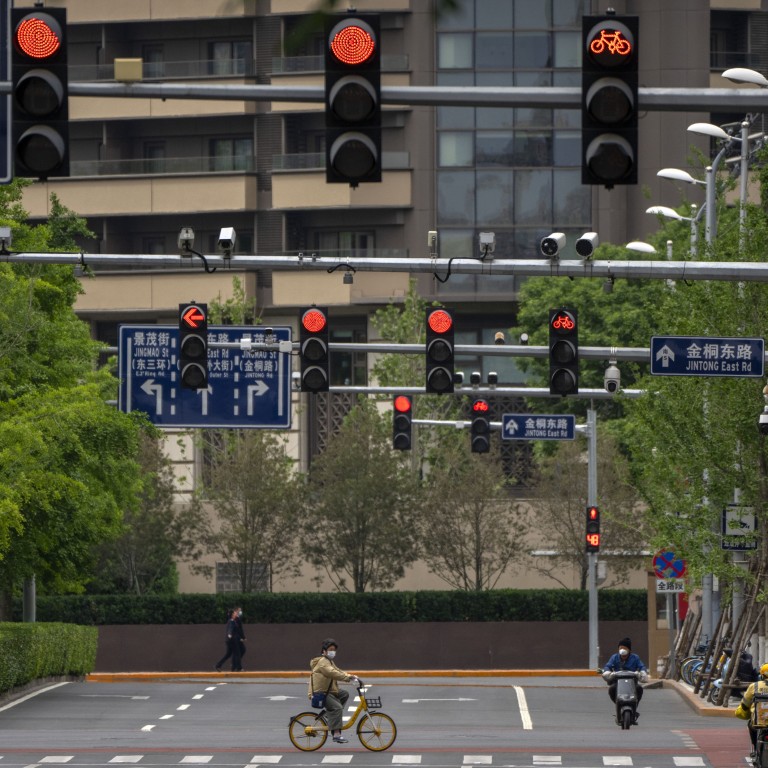
As more of China’s foreign firms, investors mull exodus amid zero-Covid controls, what can Beijing do?
- Prominent Chinese experts say flexible coronavirus controls could help foreign businesses that contribute a great deal to the national economy
- Surveys by business lobby groups continue to show how China’s restrictive measures to contain the coronavirus are having far-reaching implications
Beijing cannot afford to overlook a worrying trend of foreign companies becoming more inclined to pull out of China, according to prominent Chinese experts who also say that more flexible coronavirus controls could help address the problem.
However, a growing number of recent surveys by multiple business lobby groups in China reflects how heavy-handed containment measures are undermining foreign investors’ confidence in the world’s second-largest economy.
“If any foreign investors leave because we adhere to the ‘dynamic zero-Covid’ measures, surely China will be worried,” said Peng Peng, executive chairman of the Guangdong Society of Reform, a think tank with ties to the provincial government.
To stabilise the economy, we must stabilise foreign investment
Huo Jianguo, the former head of a think tank under China’s commerce ministry, also said the government must continue to address the hardships facing foreign companies that operate in the country.
“To stabilise the economy, we must stabilise foreign investment,” he said, stressing that the foreign-invested companies remain critical to the Chinese economy.
Both Huo and Peng acknowledged that Chinese authorities have recognised the issue and have begun to take measures to remedy the situation.
During a national teleconference on Monday, Vice-Premier Hu Chunhua called for efforts to be made to stabilise foreign investment. His comments came after the Politburo, China’s top decision-making body, said in late April that leadership would respond to the concerns and appeals of foreign investors grappling with the fallout from fresh coronavirus outbreaks and lockdowns.
European companies look to pull investments out of ‘volatile’ China
According to a survey by the German Chamber of Commerce in China released on Thursday, 28 per cent of foreign employees from surveyed companies were planning to leave China before or upon the expiration of their current contracts, due to coronavirus-related measures.
And a survey by the American Chamber of Commerce in China also showed that more than half of respondents had already either delayed or decreased their investments.
Huo said the key to retaining foreign investors is better coordination in terms of virus controls and business activity, while avoiding a “one-size-fits-all” approach and ensuring fair and consistent treatment for all types of companies.
Peng also called for the curbing of “simplified, brutal” measures in Covid controls to reassure foreign investors.
“The complete industrial chain and supply chain is China’s advantage, which should not be easily interrupted due to the pandemic controls,” said Peng, noting that these are now the “biggest hindrance” to stabilising foreign investment.
Foreign-invested enterprises are still responsible for creating around 40 per cent of trade, one-sixth of tax revenue and around 10 per cent of urban jobs in China – while accounting for a mere 2 per cent share of all companies in China, according to official figures.
In 2020, the first year of the pandemic, sales of foreign-invested wholesale companies in China rose to 6.9 trillion yuan – up 1,178 per cent since data became available in 2006.
Beijing asks German businesses to ‘help Europe view China correctly’
Sales of foreign-invested retailers also rose to nearly 1.3 trillion yuan (US$192 billion) in 2020 from just 92.5 billion yuan in 2004, according to the National Bureau of Statistics.
Beijing has repeatedly pledged in recent years to steadfastly expand opening up and continue to improve the business environment for foreign companies.
Still, on top of long-lasting issues such as market-access barriers, regulatory risks and discriminatory enforcement, the foreign-business community has also flagged rising pressure from nationalistic sentiment and geopolitical tensions in China.
And the strict zero-Covid controls across the country – particularly the month-long lockdowns in Shanghai – have added a new kind of uncertainty.
But China’s commerce ministry continues to strike an optimistic tone on the situation.
Foreign direct investment into China rose 26.1 per cent to US$74.47 billion in the first four months of the year, while investments from the US and Germany rose 53.2 per cent and 80.4 per cent respectively in yuan terms, the ministry revealed on Thursday.
“We will continue to expand high-level opening up, further optimise the service system for foreign investment, and improve targeted services,” ministry spokeswoman Shu Jueting said at a press conference on Thursday.
But in the meantime, Huo said, many foreign investors are now finding themselves caught between the West and Beijing. And he said that group includes those who are not keen on leaving China.
Additional reporting by Luna Sun


